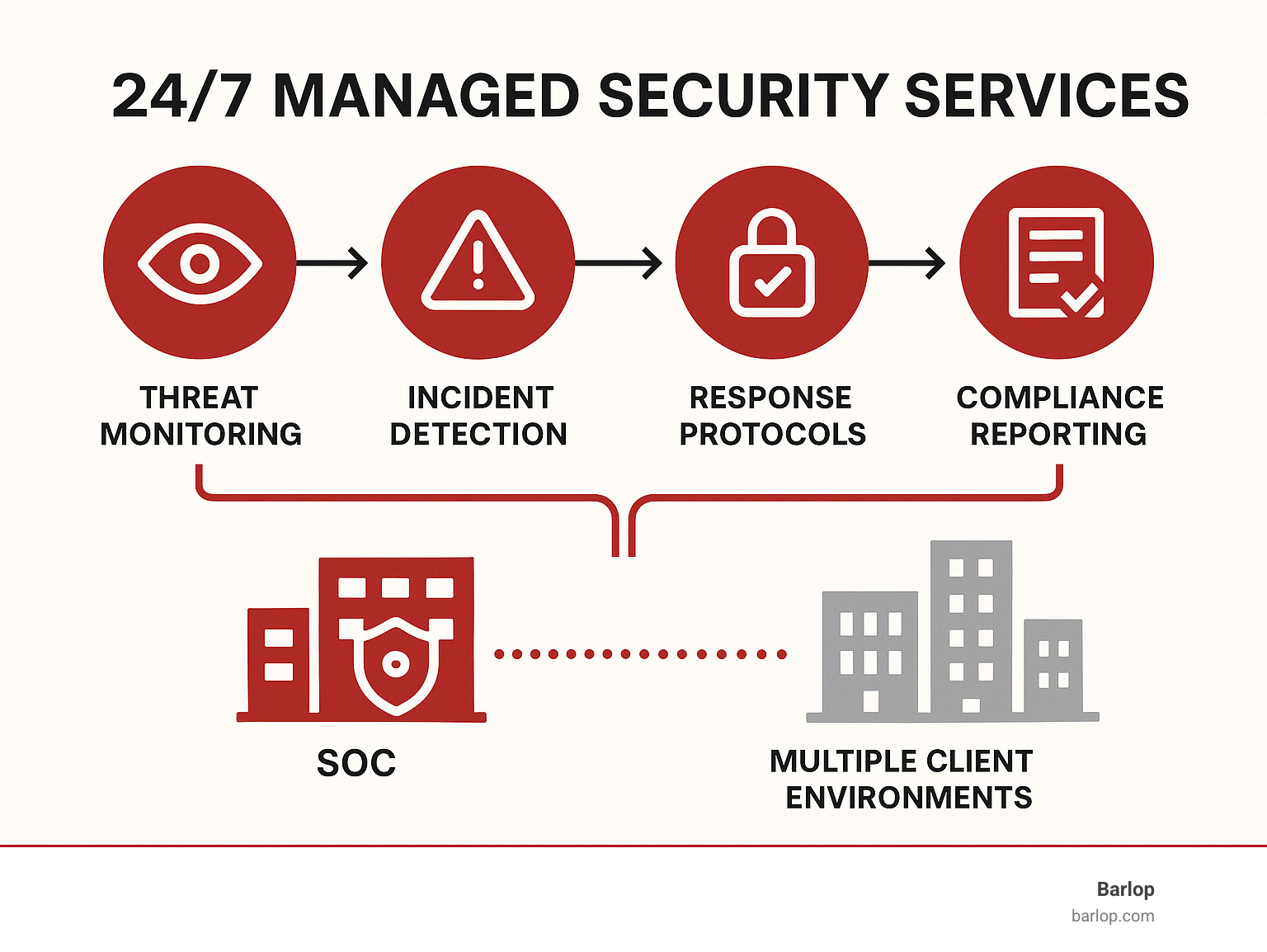Why Managed Security Services Are Critical for Modern Businesses
Managed Security Services are cybersecurity operations outsourced to third-party providers who monitor, manage, and respond to security threats 24/7. These services often include firewall management, threat detection, incident response, and compliance monitoring, all delivered from a Security Operations Center (SOC).
Quick Answer for “Managed Security Services”:
- What they are: Outsourced 24/7 cybersecurity monitoring and management.
- Core services: Threat monitoring, firewall management, incident response, vulnerability scanning.
- Who provides them: Managed Security Service Providers (MSSPs) from Security Operations Centers (SOCs).
- Key benefit: Access to enterprise-grade security without the cost of an internal team.
- Typical cost: Subscription-based, often less than hiring full-time security staff.
- Best for: Organizations lacking dedicated IT security resources.
The cybersecurity landscape is more challenging than ever. Cyberattacks are at an all-time high, and a global shortage of qualified security professionals makes it difficult for businesses to defend themselves. For organizations in Miami’s professional services, healthcare, and legal sectors, this problem is especially pressing. Many companies own dozens of security tools but lack the in-house expertise to use them effectively.
This is why a growing number of businesses are turning to managed security service providers. The high cost of a data breach—including fines, revenue loss, and remediation—far exceeds the investment in proactive security. Partnering with an MSSP provides the specialized expertise and always-on monitoring needed for modern business continuity.

What Are Managed Security Services?
Think of Managed Security Services as an expert cybersecurity team watching over your business 24/7. Instead of building this team yourself, you partner with a Managed Security Service Provider (MSSP). These specialists operate from Security Operations Centers (SOCs), which are mission control hubs for cybersecurity, using advanced tools and threat intelligence to protect your digital assets.
The global managed security services market is projected to reach an estimated $65.53 billion by 2028, reflecting that most organizations cannot fight sophisticated cyber threats alone. MSSPs deliver their expertise through several core services, including on-site consulting, perimeter management, product resale, managed security monitoring, penetration testing, and compliance monitoring.
To clarify how MSSPs fit into the broader IT services landscape, here is how they compare to other models:
| Feature | Managed Security Service Provider (MSSP) | Managed Service Provider (MSP) | Managed Detection and Response (MDR) |
|---|---|---|---|
| Primary Focus | Cybersecurity monitoring, management, and response | General IT infrastructure and operations management | Proactive threat hunting, investigation, and response |
| Core Service | 24/7 security monitoring, incident response | Network, server, desktop support, general IT security | Deep threat analysis, active remediation |
| Operational Center | Security Operations Center (SOC) | Network Operations Center (NOC) | SOC with advanced threat hunting capabilities |
| Scope of Security | Comprehensive cybersecurity across the IT environment | Basic IT security, patch management, antivirus | Focused on detection and rapid response to advanced threats |
| Approach | Proactive threat detection and incident management | Reactive problem solving, preventative maintenance | Proactive threat hunting, deep investigation, and active remediation |
Managed Security Services Explained
Outsourced monitoring and management through an MSSP is like having a digital security guard who never sleeps. This starts with managed firewalls, your first line of defense. Experts configure, monitor, and update them continuously to control traffic entering or leaving your network.
Security Information and Event Management (SIEM) acts as a detective, collecting and analyzing security logs from across your IT environment to spot suspicious patterns. When a potential threat is detected, it raises an alarm.
Continuous response is where the value of an MSSP shines. When a threat is confirmed, security analysts investigate the incident, contain it to prevent spreading, and work to restore normal operations. This 24/7 capability is essential, as cybercriminals often strike outside of business hours. Having experts ready to respond at any moment can be the difference between a minor issue and a major disaster.
Early Evolution of Managed Security Services
The concept of managed security began in the mid-1990s with Internet Service Providers (ISPs) offering to manage firewalls for their customers. Instead of buying and configuring complex hardware, businesses could outsource it. As the internet and cyber threats grew more sophisticated, these services evolved from managing a single device to providing comprehensive monitoring and response across entire IT environments, including the cloud. This adaptability has been key to the industry’s success.
Core Offerings & Delivery Models
Managed Security Services provide a comprehensive toolkit of solutions that adapt to your specific needs. The foundation is 24/7 monitoring from our Security Operations Center. We use advanced tools like SIEM and EDR to analyze security data in real time across your networks, endpoints, and cloud environments.
Our team also actively hunts for threats, searching for attackers who try to hide in your systems. Vulnerability management is another cornerstone, where we regularly scan your systems, assess risks, and help you prioritize fixes. For businesses in regulated industries, our compliance monitoring helps you meet requirements like HIPAA or PCI DSS by tracking policy violations and providing detailed reports. You can learn more about our approach to Security and Compliance on our dedicated page.
We also offer advanced services like Managed Detection and Response (MDR) and Extended Detection and Response (XDR) for more proactive protection. Our co-managed SOC model is also popular, allowing us to work alongside your internal team to fill expertise or coverage gaps. We support cloud, on-premises, and hybrid environments, providing unified security management across your entire digital landscape.
Scientific research on Managed security service continues to validate the effectiveness of these comprehensive approaches.
Comparing MDR to Managed Security Services
While traditional MSS provides the security infrastructure and surveillance your business needs, MDR takes it a step further. MDR specialists proactively hunt for hidden threats using AI and machine learning. When they find something, they don’t just notify you—they investigate, contain the threat, and assist with remediation. This active defense is particularly valuable against advanced threats that might evade traditional security controls.
Service Delivery Models
We offer several delivery models because every organization is different. What works for a law firm in Miami may not be right for a healthcare practice in Fort Lauderdale.
- Fully Managed: We take complete responsibility for your cybersecurity operations, from daily monitoring to incident response. This is ideal for organizations without dedicated security staff.
- Co-Managed: We work collaboratively with your existing IT team, filling knowledge gaps in areas like threat hunting or cloud security.
- Hybrid and Appliance-Based: We can customize an approach to fit unique needs, such as handling 24/7 monitoring while you manage incident response internally, or remotely managing security devices at your location.
No matter the model, we support your IT environment, whether it’s cloud-native, on-premises, or a hybrid of both, providing consistent protection and a unified view of your security posture.
Benefits & Challenges of Outsourcing Security
Managing cybersecurity in-house is complex, expensive, and distracts from core business goals. Managed Security Services offer a lifeline, turning security into a strategic advantage.
The financial benefits are significant. Building an in-house Security Operations Center requires massive upfront investment in staff and tools. In Miami, a single cybersecurity professional commands a six-figure salary, and you need a full team for 24/7 coverage. An MSSP provides access to an entire team of certified experts for a predictable operational expense, often for a fraction of the cost.
Beyond savings, you gain immediate access to specialized expertise, bypassing the current skills shortage. This frees your internal team to focus on innovation and growth. Other key benefits include seamless scalability as your business needs change and true 24/7 coverage, since cybercriminals don’t keep business hours. This continuous vigilance and staffing relief are game-changers for most organizations.
However, outsourcing requires careful consideration of potential challenges like vendor lock-in or data privacy concerns. These risks are mitigated by choosing a partner who offers transparent contracts, clear data handling policies, and well-defined Service Level Agreements (SLAs). For more detailed information on how we address security and compliance challenges, you can explore our comprehensive approach at our Security and Compliance page.
Potential Risks & Mitigations
We believe in addressing potential challenges head-on to build strong partnerships.
- Governance: You retain strategic control. We collaborate to define roles, responsibilities, and decision-making processes.
- Clear Service Level Agreements: Our SLAs are critical. They explicitly detail response times, reporting protocols, and performance metrics, so there are no surprises.
- Third-Party Audits: We welcome independent validation of our processes and controls, demonstrating our commitment to high standards.
- Shared Responsibility: Security is a partnership. We work with your team to ensure everyone understands their role in maintaining a strong security posture, from policy enforcement to security awareness.
How to Choose the Right MSSP
Choosing a Managed Security Service Provider is a critical decision. You are selecting a partner to protect your most valuable digital assets. The right MSSP will understand your business, industry challenges, and your growth plans.
A provider for a healthcare practice in Miami, for example, should be fluent in HIPAA compliance. Look for providers with strong industry certifications, a proven track record, and a team that can explain complex topics in plain English. Carefully review their pricing models and Service Level Agreement (SLA) to ensure they clearly define response times, performance metrics, and escalation procedures. A professional onboarding process and positive client references are also key indicators of a quality partner.
For additional context on industry standards, you can reference authoritative sources like the Gartner definition of MSSP.
Checklist for Evaluating Providers
- SOC Maturity: Does the SOC operate 24/7 with experienced, certified analysts and have backup facilities?
- Response Times: Are specific response windows for different incident severities guaranteed in the SLA?
- Reporting Capabilities: Do they provide actionable insights and customized reports, not just raw data?
- Compliance Mapping: Can they demonstrate a clear understanding of regulations relevant to your industry (e.g., HIPAA, PCI DSS) and provide audit support?
- Threat Intelligence: How do they gather intelligence on new threats and integrate it into their defenses?
- Incident Response Capabilities: What is their process for investigation, containment, eradication, and recovery? Do they offer digital forensics?
Questions to Ask a Prospective MSSP
- How will you integrate with our existing security tools?
- What is your incident escalation process and who is our point of contact during an emergency?
- How flexible is the contract regarding scaling services or termination terms?
- What is your exit strategy for transitioning clients or data if our partnership ends?
- How do you protect our data privacy and ensure confidentiality?
- Can you provide specific examples of how you’ve helped organizations similar to ours?
- What is your approach to vulnerability and patch management?
- How do you respond to new vulnerabilities and zero-day exploits?
Future Trends in Managed Security Services
The world of cybersecurity is constantly evolving, and Managed Security Services are evolving with it to stay ahead of threats. AI and machine learning are revolutionizing Security Operations Centers (SOCs), enabling faster and more accurate analysis of vast amounts of data.
Security Orchestration, Automation, and Response (SOAR) platforms are another key innovation. They automate routine tasks, freeing up human experts to focus on complex problems. This combination of AI and automation is changing threat scoring, playbook orchestration, and even predictive analytics, shifting security from a reactive to a proactive posture.
Other major trends include the shift toward zero-trust architecture (“never trust, always verify”) and the development of cloud-native security to protect modern infrastructures like containerized applications and multi-cloud environments. The security services market is forecast to grow significantly, driven by the ongoing demand for specialized knowledge and the increasing complexity of cyber threats.
The persistent cybersecurity talent shortage means partnering with an MSSP will remain an attractive strategy. We are also seeing a clear evolution toward integrated Extended Detection and Response (XDR) platforms, which provide a unified view across an organization’s entire digital landscape. For businesses throughout Florida, leveraging these advancements through an MSSP is essential for survival in today’s digital economy.

Frequently Asked Questions about Managed Security Services
We get many questions about Managed Security Services from business owners and IT managers. Here are answers to the most common ones.
What is the difference between an MSSP and an MSP?
The acronyms are similar, but the focus is very different. A Managed Service Provider (MSP) handles your general IT operations—keeping computers, servers, and networks running smoothly. They focus on IT functionality and may offer basic security like antivirus management.
A Managed Security Service Provider (MSSP), on the other hand, lives and breathes cybersecurity. Our sole focus is to defend your organization from cyber threats. We operate from dedicated Security Operations Centers (SOCs) staffed with security analysts who provide 24/7 threat monitoring, investigation, and response.
How do Managed Security Services support compliance requirements?
For businesses in regulated industries like healthcare or finance in Miami, maintaining compliance can be a major challenge. An MSSP can take much of this burden off your shoulders. We provide continuous monitoring to spot potential policy violations and maintain detailed logs and reports required for audits (e.g., HIPAA, PCI DSS, GDPR).
Our services include regular vulnerability assessments and security testing, which are often mandated by regulations. We also stay current on regulatory changes, providing guidance to ensure you remain compliant as requirements evolve.
What does a typical MSSP pricing model look like?
MSSP pricing is designed to be predictable and more cost-effective than building an in-house security team. Most providers use a subscription-based model, turning a large capital investment into a manageable operational expense.
Common pricing approaches include per-device or per-user fees, often with tiered service levels that allow you to choose the depth of coverage you need. Costs typically decrease per unit as volume increases, making enterprise-grade security accessible even for smaller organizations. This model provides comprehensive security services for a single, predictable monthly fee. For many businesses in Fort Lauderdale and across South Florida, this is the most sensible approach to security.
Conclusion
The digital world presents a paradox: technology creates incredible opportunities but also exposes businesses to constant cyber threats. For organizations across Florida, from professional services in Miami to healthcare providers in Broward County, it’s not a matter of if you’ll face an attack, but when.
This is where Managed Security Services become essential. Partnering with an MSSP gives you a dedicated team of cybersecurity experts, access to cutting-edge technology, and 24/7 vigilance—all without the cost and complexity of building your own Security Operations Center.
This approach frees your internal teams to focus on what they do best: growing your business and serving your customers. We believe enterprise-grade cybersecurity should be accessible to every organization. Our goal is to make robust protection seamless, giving you the peace of mind to operate confidently.
When you work with us, you gain a dedicated partner invested in your success. The threat landscape will continue to evolve, but with the right MSSP partnership, you can stay ahead of the challenges while focusing on what matters most.
Ready to strengthen your organization’s digital resilience even further? Our managed network services work hand-in-hand with our security offerings to create a comprehensive protection strategy.
More info about managed network services




